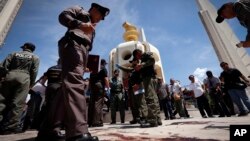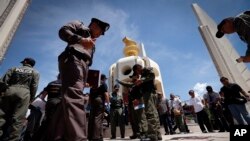BANGKOK —
Thai authorities again delayed a final decision on the date of planned general elections when anti-government protesters disrupted a key meeting. Earlier Thursday, a grenade and shooting attack killed at least three people at an anti-government protest site and the country’s army chief warned the military could step in if violence continues.
Thailand’s military largely has stayed out of the country’s political deadlock, but on Thursday the army chief condemned the latest violence and warned the military will take action to maintain law and order if it continues.
But efforts to break the standoff through new elections suffered a setback when anti-government protesters besieged a Thai Air Force base where the government and the Thai Election Commission were in talks.
Acting Prime Minister Niwatthamrong Bunsongphaisan and other government officials were forced to flee the venue as protesters neared abruptly ending talks on whether to hold the next vote on July 20.
He was later replaced by the leader of the anti-government People's Democratic Reform Committee, (PDRC) former lawmaker Suthep Thangsuban, who held talks with the Commissioners.
Chulalongkorn University political scientist Thitinan Pongsudhirak says the negotiations are unlikely to resolve the ongoing political conflict given the two sides’ sharp differences.
"Suthep and the PDRC want a so-called neutral appointed government and government and pro-government supporters do not want that. Suthep has been talking to the Election Commission and other state agencies," he said. "But these talks depend on having an appointed government which the other side opposes . So we're reaching a point, an intractable situation here, the parties are so far apart."
The governing Pheu Thai Party says it will press ahead with general elections after February polls were disrupted by the PDRC and boycotted by the opposition Democrat Party. Protesters have vowed to again block the polls.
Pheu Thai party senior member Smarn Lertwongrath says the acting government has the power to call elections and will be patient until the Election Commission agrees to a new polling date.
"We have the power to draft the law by ourselves, but if they (the Commission) say they cannot do it then the agreement between the government and the Election Commission must by unanimous. If it is not unanimous the election commission will have the excuse (and say) we cannot do that. So we have to be patient and make it best to be unanimous," said Lertwongrath.
Smarn says the anti-government groups are unlikely to have the legal rights to call for a non-elected prime minister under the current constitution and any move would be resisted by the pro-government red shirt supporters.
Thailand's Law Reform Commission Wednesday recommended a series of proposals to end the conflict.
But independent legal analyst, Benjamin Zawacki, says the judiciary alone is not seen as impartial by government supporters. Last week, the constitutional court dismissed Prime Minister Yingluck Shinawatra and nine cabinet members over charges of nepotism related to the reshuffling of a senior civil servant.
"When you have the primary arbiter - namely the judiciary as part of the conflict, not standing above the conflict as a disinterested third party but certainly perceived as a party to that conflict then where do you go next? Right now in Thai society neither side sees the courts as that (impartial)," said Zawacki. "The Reds very clearly see the courts as being part and parcel of the conflict."
At least 28 people have been killed and hundreds wounded since the political conflict erupted late last year.
Thailand’s military largely has stayed out of the country’s political deadlock, but on Thursday the army chief condemned the latest violence and warned the military will take action to maintain law and order if it continues.
But efforts to break the standoff through new elections suffered a setback when anti-government protesters besieged a Thai Air Force base where the government and the Thai Election Commission were in talks.
Acting Prime Minister Niwatthamrong Bunsongphaisan and other government officials were forced to flee the venue as protesters neared abruptly ending talks on whether to hold the next vote on July 20.
He was later replaced by the leader of the anti-government People's Democratic Reform Committee, (PDRC) former lawmaker Suthep Thangsuban, who held talks with the Commissioners.
Chulalongkorn University political scientist Thitinan Pongsudhirak says the negotiations are unlikely to resolve the ongoing political conflict given the two sides’ sharp differences.
"Suthep and the PDRC want a so-called neutral appointed government and government and pro-government supporters do not want that. Suthep has been talking to the Election Commission and other state agencies," he said. "But these talks depend on having an appointed government which the other side opposes . So we're reaching a point, an intractable situation here, the parties are so far apart."
The governing Pheu Thai Party says it will press ahead with general elections after February polls were disrupted by the PDRC and boycotted by the opposition Democrat Party. Protesters have vowed to again block the polls.
Pheu Thai party senior member Smarn Lertwongrath says the acting government has the power to call elections and will be patient until the Election Commission agrees to a new polling date.
"We have the power to draft the law by ourselves, but if they (the Commission) say they cannot do it then the agreement between the government and the Election Commission must by unanimous. If it is not unanimous the election commission will have the excuse (and say) we cannot do that. So we have to be patient and make it best to be unanimous," said Lertwongrath.
Smarn says the anti-government groups are unlikely to have the legal rights to call for a non-elected prime minister under the current constitution and any move would be resisted by the pro-government red shirt supporters.
Thailand's Law Reform Commission Wednesday recommended a series of proposals to end the conflict.
But independent legal analyst, Benjamin Zawacki, says the judiciary alone is not seen as impartial by government supporters. Last week, the constitutional court dismissed Prime Minister Yingluck Shinawatra and nine cabinet members over charges of nepotism related to the reshuffling of a senior civil servant.
"When you have the primary arbiter - namely the judiciary as part of the conflict, not standing above the conflict as a disinterested third party but certainly perceived as a party to that conflict then where do you go next? Right now in Thai society neither side sees the courts as that (impartial)," said Zawacki. "The Reds very clearly see the courts as being part and parcel of the conflict."
At least 28 people have been killed and hundreds wounded since the political conflict erupted late last year.





